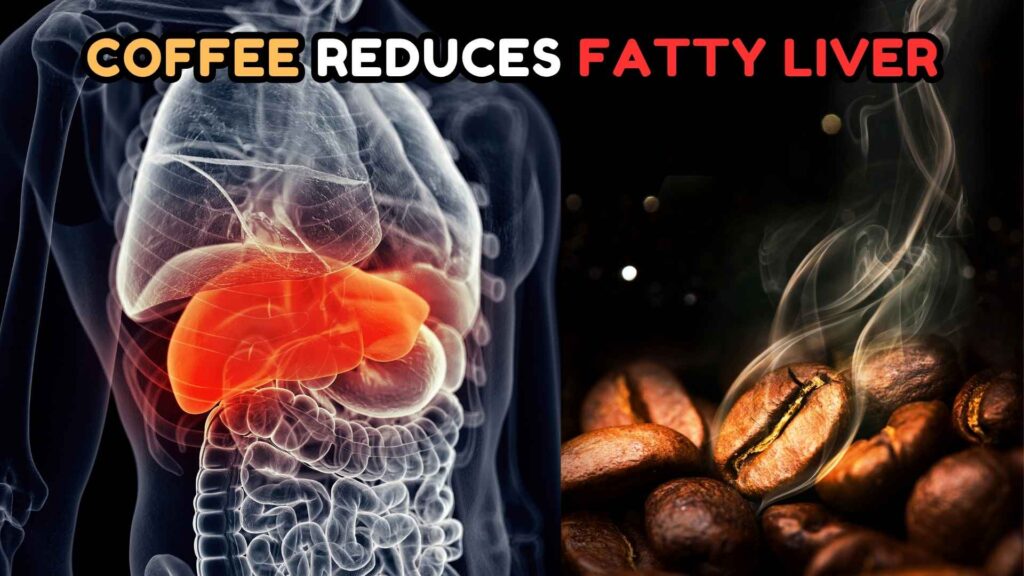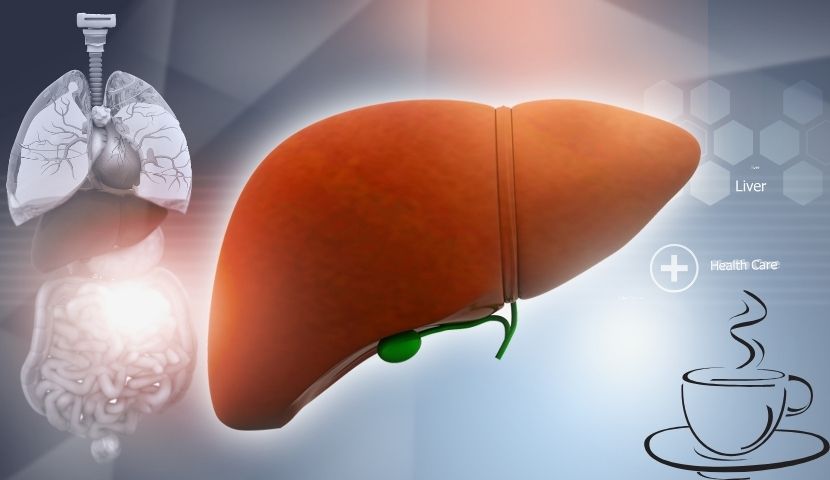Coffee isn’t just a comforting morning drink; it holds potential as a powerful ally in promoting liver health. Increasing research supports that regular coffee consumption could play a significant role in reducing the risk and progression of fatty liver disease, particularly Non-Alcoholic Fatty Liver Disease (NAFLD).
In this article, we explore how coffee affects liver health, including its antioxidant properties, impact on liver enzymes, and its role in reducing liver inflammation.

Understanding Fatty Liver Disease
What Is Fatty Liver Disease?
Fatty liver disease occurs when excess fat accumulates in liver cells, leading to inflammation and potential liver damage. There are two primary forms of fatty liver disease:
- Non-Alcoholic Fatty Liver Disease (NAFLD): A condition where fat builds up in liver cells in people who do not consume excessive alcohol. NAFLD is the most common liver disease worldwide and is frequently linked to metabolic disorders such as obesity and diabetes.
- Alcoholic Fatty Liver Disease (AFLD): As the name suggests, this form of fatty liver disease is caused by excessive alcohol consumption.
NAFLD can progress to more serious conditions such as non-alcoholic steatohepatitis (NASH), liver cirrhosis, or even liver cancer if left untreated.
Coffee and Liver Health: The Science Behind the Brew
Antioxidant Properties of Coffee
One of the primary reasons coffee is beneficial for liver health is its antioxidant content. Coffee contains a wide variety of bioactive compounds, including chlorogenic acids and polyphenols, both of which have potent antioxidant effects. These antioxidants play a critical role in:
- Reducing Oxidative Stress: Oxidative stress is a key factor in liver inflammation and damage. The antioxidants in coffee help neutralize harmful free radicals, which are byproducts of metabolism that can damage liver cells over time.
- Inhibiting Fat Accumulation in the Liver: Studies show that these antioxidants can reduce lipid accumulation in liver cells, decreasing the risk of fatty liver disease and related complications.
A study from the Cleveland Clinic highlights the hepatoprotective effects of chlorogenic acid in coffee and its potential in reversing liver damage caused by oxidative stress.
The Role of Caffeine in Liver Health
Caffeine is the most well-known active compound in coffee. However, its impact on liver health goes beyond providing a morning energy boost. Caffeine plays several roles in supporting liver function:
- Enhancing Lipid Metabolism: Caffeine has been shown to stimulate the breakdown of fats, helping reduce the accumulation of fat in liver cells. This process helps prevent or manage fatty liver disease by accelerating fat metabolism.
- Reducing Inflammation: Chronic inflammation is one of the primary drivers of liver damage in conditions like NAFLD. Caffeine has anti-inflammatory effects that help decrease the activation of inflammatory pathways in the liver, thereby reducing liver inflammation.
- Preventing Liver Fibrosis: Research suggests that caffeine can inhibit the activation of hepatic stellate cells, which play a key role in the development of liver fibrosis. By preventing this process, caffeine can reduce the risk of the liver becoming scarred and stiff (fibrosis), which may eventually lead to cirrhosis.

Coffee’s Impact on Liver Enzymes
Liver enzymes are proteins produced by the liver to help with various metabolic processes, including detoxification. When the liver is damaged, levels of certain enzymes, like alanine aminotransferase (ALT) and aspartate aminotransferase (AST), can increase in the blood, signaling liver injury.
Regular coffee consumption has been shown to have a normalizing effect on liver enzymes, especially in individuals with fatty liver disease. By improving liver function, coffee consumption helps reduce the levels of these elevated liver enzymes, which is a sign of improving liver health.
Research Findings on Coffee and Fatty Liver Disease
Epidemiological Studies: Coffee Drinkers Have Lower Risk of NAFLD
Epidemiological studies consistently show a significant association between coffee consumption and a reduced risk of developing fatty liver disease. A comprehensive study published in Clinical Gastroenterology and Hepatology revealed that coffee drinkers had a significantly lower risk of NAFLD compared to non-drinkers.
Moreover, coffee consumption has been linked to a reduced risk of liver fibrosis, a common complication of fatty liver disease. Fibrosis, if left untreated, can progress to more severe liver conditions like cirrhosis.
Meta-Analyses: Stronger Evidence for Coffee’s Liver Benefits
Several meta-analyses have reinforced the protective role of coffee in liver health. One study found that two to three cups of coffee per day were associated with a 44% reduced risk of cirrhosis and that drinking four cups daily could reduce the risk by as much as 65%.
These studies suggest that regular coffee consumption may be a key factor in preventing liver damage and improving liver health, especially for individuals at risk of developing NAFLD or liver fibrosis.
Clinical Trials: Coffee and Liver Stiffness
Clinical trials have provided additional insights into coffee’s potential to reduce liver damage. One study demonstrated that coffee drinkers with chronic liver disease had improved liver stiffness scores compared to non-coffee drinkers. Liver stiffness is a common marker of liver fibrosis, which indicates the degree of liver scarring and overall liver function.
These results suggest that coffee not only helps reduce fat accumulation in the liver but also plays a role in preventing or slowing the progression of liver fibrosis.

How Much Coffee Should You Drink?
While the benefits of coffee for liver health are well-supported by research, moderation is key. Although drinking coffee can reduce the risk of fatty liver disease, excessive intake can lead to side effects such as:
- Insomnia
- Increased heart rate
- Digestive issues
Recommended Coffee Intake for Liver Health
- Two to Three Cups Daily: This amount has been associated with a lower risk of liver disease and improved liver enzyme levels. A cup of coffee typically contains around 95 milligrams of caffeine, which is generally considered safe for most people.
- Moderation is Key: Excessive coffee consumption (more than four cups per day) could cause side effects, so it’s important to maintain balance.
Best Practices for Coffee Consumption
To maximize the liver health benefits of coffee, consider the following practices:
| Best Practices for Coffee Consumption | Why It Matters |
|---|---|
| Opt for Black Coffee | Adding sugar and cream can negate coffee’s liver benefits. |
| Choose Organic Coffee | Organic coffee is free of harmful pesticides and mycotoxins that can burden liver detoxification. |
| Avoid Flavored Syrups | Artificial sweeteners and syrups can add excessive calories and sugar, reducing health benefits. |
| Combine with a Healthy Lifestyle | Coffee is most effective when paired with a balanced diet and regular exercise. |
Incorporating healthy lifestyle practices alongside coffee consumption can enhance its positive effects on liver health. Regular physical activity and a diet rich in fruits, vegetables, and healthy fats support liver detoxification and overall well-being.
Potential Side Effects of Excessive Coffee Consumption
While coffee has numerous health benefits, it is essential to consume it in moderation. Excessive coffee intake may result in several side effects, including:
- Digestive Discomfort: Drinking too much coffee may irritate the stomach lining, causing issues like acid reflux or gastritis.
- Anxiety and Jitters: High caffeine intake can lead to increased anxiety, jitteriness, or even heart palpitations.
- Disrupted Sleep Patterns: Drinking coffee late in the day may interfere with sleep, leading to insomnia.
It’s important to balance coffee consumption with other healthy habits and consult with a healthcare provider before making significant changes to your daily routine.
Conclusion
Moderate coffee consumption offers impressive health benefits, particularly for liver health. Through its antioxidant properties, caffeine content, and positive impact on liver enzymes and inflammation, coffee can reduce the risk of fatty liver disease, improve liver function, and potentially slow the progression of liver fibrosis. However, like any lifestyle change, it’s crucial to approach coffee consumption as part of a balanced, holistic approach to health that includes proper diet and regular exercise.
Before making significant dietary changes, it’s always best to consult with a healthcare provider to ensure that coffee consumption is appropriate for your individual health needs.
Sources:
- Disclaimer: This article is intended for informational purposes only and should not be considered medical advice. Always consult with a healthcare provider for personalized recommendations.



0 Comments